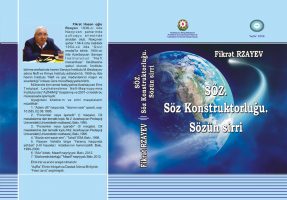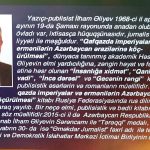ABOUT ADAM’S LANGUAGE

“ABOUT ADAM’S LANGUAGE”
During milleniums there are talks among people about that God after creating holy prophet Adam taught him words and speaking. We meet respective information about it in sacred writings, and mainly in the Qurani-Karim. But up to date this issue has not been studied scientifically, there have not been conducted appropriate research works on linguistics. Therefore, the role of labour and respective theory have been preferred as evolution process in formation of different languages.
As we consider, this theory as well as other theories which had been basically criticized (about formation of language: sound imitation, exclamations, social consent, gestures, labour cries and etc.) cannot be taken as basis in solution of linguistic problems. Because, as language is the research object of linguistics, identification of its origin, as well as solution of other problems concerning linguistics have to be researched in linguistics itself.
The different questions that we face, for example: “Why do the structures of Russian and Slavonic words just a little differ from the structure of words in the Azerbaijani language? How was the Azerbaijani language itself created? Why was any thing named just like this? Why was not the watermelon called, for example, by the word “snake?” and etc. question were the reason of conduction of the research work in sphere of linguistics. Thereby, the results which were obtained for the Azerbaijani language successfully cleared the way for understanding of inside meanings of many Russian, German, English, Arabic words.
The main results of the researches are the followings:
- Any phoneme (spoken sound) has one or several features or duties. These features and duties are universal for the phonemes sounding the same way in many languages. Vowel phonemes are mainly associated with geometrical concepts and play role of directives of consonants being indicators of event in words. Absence of vowels in language creates multiplicity of syllables of words, i.e. the vowels have a bit more ability of explanation and direction of events. The vowels in words express mainly physical (space, time-period, distance, direction, different influences and their quality of being relatively valuable, work, power, energy, and etc.), psycological (comprehension, negation, harm, damage, reduction, strengthening, thoughtfulness, frailty, soul-sense and etc.) concepts and events and those concerning wildlife (human, animals, vegetations).
Even within one language the features and duties of many phonemes have ability to repeat each other and to form identity. Obviously, God preferring many-colouredness, variety, wariness principles in conversation, saved human from boredom and even gave opportunity for multivariance on the base of phonemes with identical features, created conditions for generation of homonyms and synonyms within one language, even for generation of different languages being entirely different prima facie and not considered to be relative. Mathematical and variative characteristics were followed here.
According to result of our research, the number of features and duties of phonemes reach 70-80 at present. As we consider, approximately 20-30 features and duties that will be found in the future may cause improvement and completion of the phoneme debate, and knowing approximately 100-120 features and duties of phonemes, it is possible to generate the words with many meanings covering different languages.
- Words are generated by purposefull, consecutive concrete order of phonemes, by successive expression of their meanings. Stresses in roots of words indicate, which syllabe within the word conveys the main meaning, but in words with affixes they indicate, where the main purpose should be seeked. And the phonemes in the parts of words without stress explain qualities of the thing and way of occurrence of the event.
It is known that, the simplest words by structure consist of one, two or three sounds, and the more sounds in the word the more complex is the word’s structure. And the phonemes having complex sound cause enlargement of meaning even more. There are very few one-sound words in languages. It is known that in the modern Azerbaijani language there are 9 vowels and 24 consonants. The number of succession variants of possible two-sound morphemes with first vowel and the second consonant sounds is 216. And the same number of morphemes with first consonant and the second vowel sounds make mathematically possible variance of two-sound words. Approximate calculations had shown that in the modern Azerbaijani language 72 words with 110 meanings on the I type of construciton, and 18 words with 23 meanings on the II type of construciton are used as root morphemes, in independent meanings. If to take into account other inner regularities of the Azerbaijani language and conventionalities of occurrence of events in the Universe, as well as on the Earth, it becomes clear that 75 morphemes cannot be used as independent words. So, in general 267 remaining variants play role of reserve for creation of both subordinate and two-sound additional root morphemes. So that to imagine the issue wider, there have been conducted researches for three-sound words too. It became clear that though for the Azerbaijani language the total number of possible variance of three-sound words is 7128, now in the language there are used 1163 root morphemes having approximately 1396 meanings, that makes 16.3%. Lets show for comparison, for the Russian language these approximate numbers are accordingly 3402, 256, 248 and 7.3%.
As we see from above made calculations God created big opportunities and inner reserves for men for generation of words in any language and for their wide use.
- Great majority of phonemes attract features of physical events. Human anatomy, his speaking- acoustic system was created coordinated with and adapted to events happening in environment, and in balance with them. If in mankind history more than one great languages had existed, and they also had been subordinate to objective lows of physical events and human psycology, so they can be found out by appropriate investigations of the modern languages.
- Investigations of Azerbaijani, Russian, German, English and Arabic words display that regardless of the present morphological division of languages (amorph-rooted, agglutinative, inflexional and incorporated languages) they all have incorporation (word-sentence) characteristics. Separate sounds in these languages have universality in spite of little differences. Therefore, there is opportunity to think upon more general division systems of languages than present genealogical division.
- Long pronounced vowels indicate the way of development of events in the word and serve to exact comprehension of the meanings.
These characteristics exist also in the words of Azerbaijani language which are not considered to be loanwords. So, this state cannot be related to only Arabic and Persian words, and there appears necessity to reconsider origin of the words considered to be loanwords.
- Though lexical meanings of the things and events called the same way in different world languages are identical (mainly), the features of the phonemes in these words in many cases give relatively less or more information about those things and events. Thus, while compiling linguistic dictionaries, especially glossaries, etymology dictionaries and terminological dictionaries combined analysis of the words having the same meaning in different world languages may give useful results in broad comprehension of their meanings.
Thereby, linguistics, in spite of its great successes to date, cannot answer a lot of fair questions overstepping its essencial course. That is why every nation used to consider creation of its language absolutely its own merit, and this fact morally estranged one nation from another. As a result, different faithes, sects have been created, the thoughts about unity of the world and universe have remained just in talks and in writing, brotherhood of people has been forgotten, and our holy grand Adam has been withdrown from attention and from his decent rank.
As we consider, on basis of displayed arguments every person thoroughly knowing his native language, alongside with it, will be able to learn easily and fastly other relative and not relative languages as well.(book’s pages 472-474)
Fikrat Rzayev
BY EDITORIAL STAFF: F.Rzayev’s article devoted to general linguistics problems reached our editorial office together with reviews of professors Afat Gurbanov and Abulfaz Rajabov. Taking into account interesting subject of the author’s views and polemic spirit of the article we considered its publication advisible.
“Islamin Sasi” (The “Voice of Islam”) newspaper; 10(58), 1995.08.02
Translated by Amiraslanova Kamala Ahad gizi







